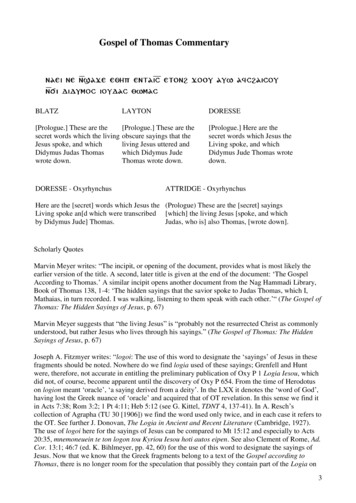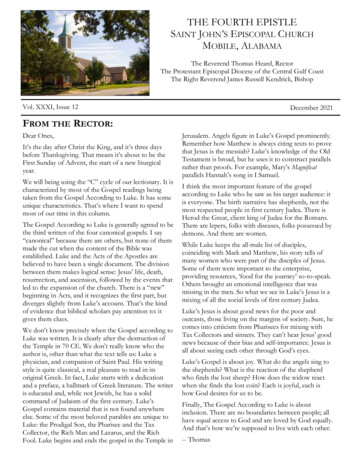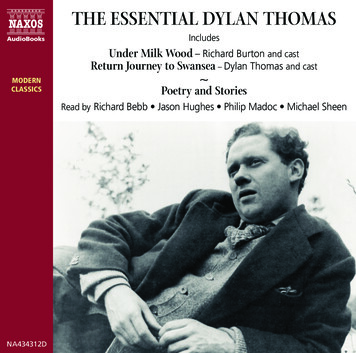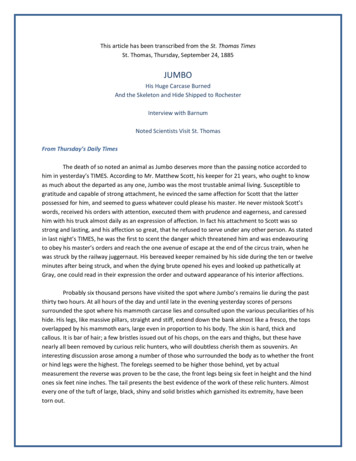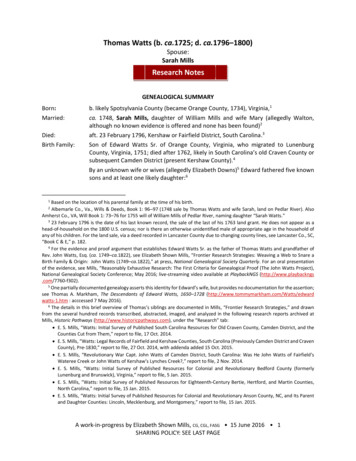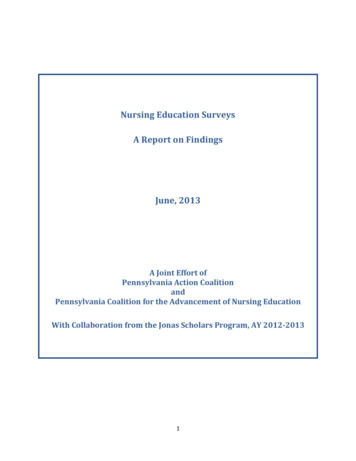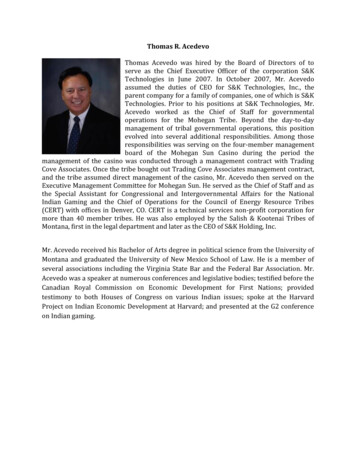
Transcription
Thomas R. AcedevoThomas Acevedo was hired by the Board of Directors of toserve as the Chief Executive Officer of the corporation S&KTechnologies in June 2007. In October 2007, Mr. Acevedoassumed the duties of CEO for S&K Technologies, Inc., theparent company for a family of companies, one of which is S&KTechnologies. Prior to his positions at S&K Technologies, Mr.Acevedo worked as the Chief of Staff for governmentaloperations for the Mohegan Tribe. Beyond the day-to-daymanagement of tribal governmental operations, this positionevolved into several additional responsibilities. Among thoseresponsibilities was serving on the four-member managementboard of the Mohegan Sun Casino during the period themanagement of the casino was conducted through a management contract with TradingCove Associates. Once the tribe bought out Trading Cove Associates management contract,and the tribe assumed direct management of the casino, Mr. Acevedo then served on theExecutive Management Committee for Mohegan Sun. He served as the Chief of Staff and asthe Special Assistant for Congressional and Intergovernmental Affairs for the NationalIndian Gaming and the Chief of Operations for the Council of Energy Resource Tribes(CERT) with offices in Denver, CO. CERT is a technical services non-profit corporation formore than 40 member tribes. He was also employed by the Salish & Kootenai Tribes ofMontana, first in the legal department and later as the CEO of S&K Holding, Inc.Mr. Acevedo received his Bachelor of Arts degree in political science from the University ofMontana and graduated the University of New Mexico School of Law. He is a member ofseveral associations including the Virginia State Bar and the Federal Bar Association. Mr.Acevedo was a speaker at numerous conferences and legislative bodies; testified before theCanadian Royal Commission on Economic Development for First Nations; providedtestimony to both Houses of Congress on various Indian issues; spoke at the HarvardProject on Indian Economic Development at Harvard; and presented at the G2 conferenceon Indian gaming.
Gregory AndersonGregory Anderson is the Superintendent of the EufaulaDormitory in Eufaula, OK. He has been involved in Indianeducation for 27 years at many levels and has served onnumerous Federal committees for improvement and reform inIndian education.Mr. Anderson was appointed in April 2002 by President GeorgeW. Bush to serve on the National Advisory Council on IndianEducation (NAICE) and was re-appointed by President BarackObama to continue serving on NACIE in August 2010. TheNACIE members are appointed by the President and advise theSecretary of Education on issues such as funding,administration, and the development of regulations andadministrative policies related to Indian education programs.He was selected in 2002 to serve on the Department of Interior, Bureau of Indian AffairsNegotiated Rulemaking Committee. He served as Co-chairman for the committee thatdeveloped recommendations for proposed regulations for the No Child Left Behind (NCLB)Act of 2001. These issues related to several specific areas that affected Indian education. Heis currently serving a second term as Co-chairman for the NCLB School Facilities andConstruction Negotiated Rulemaking Committee convened in January 2010. The Secretaryof the Interior established this committee for purposes of preparing a catalog and reportsregarding the physical conditions of Bureau-funded schools and to revise home living(dormitory) standards.In July 2010, Oklahoma Governor Brad Henry appointed Mr. Anderson to the OklahomaAdvisory Council (OACIE) on Indian Education. The OACIE was created to promoteequitable and culturally relevant learning environments, educational opportunities, andinstructional material for Native American students enrolled in public schools in the state.The legislation (HB 2929) forming the council was signed by Governor Henry and becameeffective July 1, 2010.He is involved in public service at the local level by serving as Vice-Mayor and CouncilPresident for the city of Eufaula, OK. He has served for 12 years in this capacity.Mr. Anderson is a graduate of Eufaula High School and earned his Bachelor of Arts degreein journalism from the University of Oklahoma, a master’s degree in educationadministration from East Central Oklahoma University, and a Superintendent’sCertification through the Oklahoma State Department of Education. He resides in Eufaula,OK, and is married to Becky Anderson. They have two children, son Brett, 17, and daughterAlex, 13, who attend Eufaula Public Schools.
Theresa Arevgaq JohnDr. Theresa Arevgaq John is an Associate Professor in the Department ofAlaska Native and Rural Development at the University of Alaska Fairbanks.Dr. John has also been Assistant Professor and Director of the Rural AlaskaNative Adult Program at Alaska Pacific University. She has authorednumerous academic articles and a book on Native Alaskans and haspresented her work at dozens of local, national, and internationalprofessional conferences.Dr. John currently serves on the Alaskan State Council Arts Board and is theformer Chair of the Traditional Native Arts Panel. She is also the recipient ofthe Governor’s Distinguished Humanities Educator Award. Dr. John receivedher B.S., M.Ed., and Ph.D. from the University of Alaska Fairbanks.
Derek J. BaileyDerek J. Bailey was sworn in as Tribal Chairman on December11, 2008. He is the fifth Chairman since the Grand TraverseBand was federally reaffirmed on May 27, 1980, and is theyoungest in the tribe’s history. Mr. Bailey served on the TribalCouncil from 2004 through 2008, over 2 of those years were asSecretary on the Executive Council.Mr. Bailey is currently the Chairman of the Inter-Tribal Council,and has recently been selected as the Chairman of ChippewaOttawa Resource Authority (CORA), which is comprised of fivetribes. Along with those positions, he was also appointed as oneof two Bemidji Area Representatives to the Indian HealthService Director’s Tribal Consultation Committee. In May 2010, Mr. Bailey was appointedby President Obama to the National Advisory Council on Indian Education.He received a master’s degree in social work from Grand Valley State University (GVSU) in1998. He has extensive work experience in both clinical and administrative work in thearea of behavioral health. Mr. Bailey has worked in the past for GVSU, teaching as anadjunct professor in their Master of Social Work program. He and his wife, Tonia, reside inLeelanau County with their five children: Panika, Nimkees, Daanis, Ohsaw Kihew, andMaengun.
Robin A. ButterfieldAn enrolled member of the Winnebago Tribe of Nebraska withancestry also from the White Earth Ojibewa Tribe ofMinnesota, Robin Butterfield has over 30 years of experienceas an educator. She works as a Senior Liaison within theMinority Community Outreach Department National EducationAssociation (NEA). Before working at NEA, Ms. Butterfield wasthe Professional Development Specialist at the Center forSchool Improvement within the Bureau of Indian Affairs inAlbuquerque, NM. Ms. Butterfield recently managed thecontracts with 13 tribally controlled community colleges andstate universities, providing staff development to Bureau ofIndian Affairs funded schools.Ms. Butterfield worked at the classroom level in tribal and public schools in WI;coordinated the Salem-Keizer Indian Education Program at the district level; served in theposition of Indian Education/Civil Rights Specialist for the State of Oregon for nine years;and worked at two different regional educational technical assistance centers, NorthwestRegional Educational Laboratory in the Research and Development for Indian EducationProgram and the Gonzaga University Indian Education Center III Technical AssistanceCenter.Ms. Butterfield has written publications focusing on parental involvement, curriculumdevelopment, teacher training, and multicultural education. She has served in manyleadership capacities at the state and national level, and has been elected president whileserving three 3-year terms on the National Indian Education Association Board ofDirectors. Ms. Butterfield has delivered hundreds of workshops on a wide variety of topics;has created a leadership program for Indian middle and high school aged youth; and has abroad network of individuals and organizations in the American Indian, Alaska Native andNative Hawaiian communities. She is the proud parent of three children, one of whom justgraduated from the University of Oregon and two who are still enrolled in the sameuniversity.
Deborah Jackson-DennisonBorn in Fort Defiance, AZ, Dr. Deborah Jackson-Dennison is ofScottish decent of the McPherson Clan on her maternal side,while her paternal heritage is of the Kin’ya’anni (ToweringHouse) Clan of the Navajo Indian people and her paternalgrandfather is of the Ashi’hi’ (Salt) Clan. Known to most as“Debbie,” she and her sisters grew up in the competitive worldof both Indian and Professional rodeo participating nationallyin barrel racing competitions in the Indian and women’sprofessional rodeo circuits. She and her husband, KarletsDennison, have three children; Kyle, Devyn, and Kassidy, andtogether they all continue the lifestyle of cattle ranching androdeo from their home in Tohatchi, NM.Dr. Jackson-Dennison earned an Associate of Arts degree from Dine’ (Navajo Community)College and a Bachelor of Arts degree in education was earned from the University of NewMexico. She taught both at the high school and college levels for 11 years prior to returningto successfully complete both her Master’s and Doctor of Education degrees in educationalleadership and policy studies at Arizona State University, Tempe, AZ, in 1997 and 2001,respectively. Dr. Jackson-Dennison credits her father, Dr. Dean C. Jackson, a Navajoeducational leader with us only in spirit today, for instilling the ability to maintainperseverance and resilience as she carries out the leadership responsibilities for thebetterment of Indian Country. She has now been in education for over 25 years.In 2002, Dr. Jackson-Dennison became the first Navajo woman in Arizona to become apublic school Superintendent of Schools for Window Rock Unified School District No. 8,which is also her alma mater. In 2006, Dr. Jackson- Dennison was then selected to serve asSuperintendent of Schools for a neighboring Navajo Nation public school district, 30 mileswest of Window Rock, in Ganado, AZ. She continues to look toward her father’s teachingsand legacy on the Navajo philosophy of life-long learning in the field of Navajo IndianEducation as the foundation to integrate research-based school reform as a means toprovide quality and culturally relevant learning for all stakeholders (i.e., students, parents,teachers, staff, and community members) who all have a vested interest in the bettermentof nation-building for the Navajo Indian people and society.Dr. Jackson-Dennison believes passionately in the ideology of continuous schoolimprovement for quality and excellence in education for the Navajo Indian students sheserves. In 2009, Dr. Jackson-Dennison returned to her former post as Superintendent ofSchools for Window Rock Unified School District, where once again she and her team arestriving to revitalize the Embracing Change for Student Learning systemic reform model tocorrelate with the Navajo philosophy of life long-learning while encompassing thecomponents of the Elementary and Secondary Education Act to be reauthorized for herNavajo Indian students to have the quality education system they deserve.
Sam McCrackenSam McCracken, General Manager of Nike’s N7 programs andChairman of the N7 Fund, is a member of the Sioux andAssiniboine tribes in northeastern Montana on the Ft. PeckIndian Reservation.Mr. McCracken began his Nike tenure in 1997 at Nike’sWilsonville distribution center. He was quickly asked to utilizehis experience and passion to manage the revitalization of theNative American Employee Network, one of several Nikediversity programs. Shortly thereafter, Mr. McCrackenproposed a business development strategy targeting NativeAmerican communities with the goal of increasing health andwellness through physical activity. He became the Manager of Nike’s Native AmericanBusiness in 2000 and has led the development of the Nike Air Native N7 shoe, the N7 retailcollection, and the N7 Fund, which is aimed at helping to create access to sport for NativeAmerican and Aboriginal youth in the United States and Canada.He has been recognized through several prestigious award nominations for his passion andwork. He was honored in July 2004 with Nike’s Bowerman Award, named after influentialNike co-founder and revered track and field coach Bill Bowerman. The annual awardrecognizes Nike employees who “Remember the Man” by embodying the Bowerman legacyof tireless motivation, innovation, and inspiration.Mr. McCracken was also honored in 2004 for his work by the Freedom Foundation at ValleyForge, who awarded him its prestigious George Washington Honor Medal for hiscommitment to Native communities on health promotion programs. He was singled out forexemplifying “the essence of the National Awards by promoting an understanding andappreciation for our country’s rich heritage and unique freedoms,” according to FreedomsFoundation President and CEO Aaron Siegel.In April 2007, he was coined a “corporate change maker” and recognized as one the 20most innovative “Intrapreneurs” in the world by sustainability.com.More recently, he has been honored with the 2010 President’s “Leadership Award” fromthe National Indian Gaming Association for Nike’s commitment to Health PromotionsDisease Prevention with native communities across the U.S.In his spare time, Mr. McCracken enjoys playing golf, traveling, or being in a gym coachinggirls’ basketball in Sherwood, OR, where he currently resides with his wife.
Wayne NewellWayne Newell is from Indian Township in Maine. He is amember of the Passamaquoddy Tribe. Educated at the localschools, Mr. Newell earned a master’s degree in 1971 in thefield of educational administration from Harvard University.Mr. Newell’s first love is the preservation of thePassamaquoddy language. In 1971, he directed the firstbilingual/bicultural education program for the PassamaquoddyTribe. This program included the introduction of a writingsystem for the Passamaquoddy language that continues to bespoken and written by tribal members today. He authored andco-authored over 40 reading books written in thePassamaquoddy/Maliseet language. He worked with several tribal members and linguistswhich recently published a dictionary with more than 18,000 entries.He has also been active in his tribe’s continuing struggles for justice for Native people. Hehas served on many of the tribe’s leadership positions. Currently he serves on thePassamaquoddy Tribal Council, and he was a former Representative of the Maine StateLegislature. Mr. Newell was previously appointed by former President Jimmy Carter toserve on NACIE in the late 1970s. For over 29 years, Mr. Newell has served as President ofNortheastern Blueberry Co., a tribally owned business that grows wild blueberries.Mr. Newell has an extensive relationship with the University of Maine education system. Hewas part of the original formation of university’s Native Studies Program. In May 1990, Mr.Newell received a distinguished achievement award from the University of Maine atMachias. Mr. Newell currently serves on the Board of Trustees of the University of MaineSystem.Mr. Newell’s most prized position in life is being married to Sandy for 42 years, a father to 4children and “grandpa” to many grandchildren. Mr. Newell is a story teller and singer ofPassamaquoddy and other Native music. He and fellow singer Blanch Sockabasin recentlyappeared at the American Folk Festival in Bangor, Maine, at the Library of Congress, and atthe Millennium Stage of the Kennedy Center in Washington, DC. He serves as emcee duringthe tribe’s annual Native Day celebrations that are held on the second weekend in August atSipayik (Pleasant Point), Maine.
MaryJane Oatman-Wak WakMary Jane Oatman-Wak Wak is an enrolled member of the NezPerce Tribe from Kamiah, ID. She was appointed as Idaho’s firstIndian Education Coordinator by Idaho’s Superintendent ofPublic Instruction in 2007. She was previously an EducationSpecialist for the University of Idaho’s Northwest NationsEducation Opportunities Center. She has been involved inlanguage preservation efforts and native language instructionin PreK-20 settings, college transition skills, and teachingelders the basics of computer skills.She is a graduate of Lewis and Clark State College with abachelor’s degree in justice studies and a minor Nez Percelanguage and is working toward completion of a master’s degree at the University of Idaho.In 2008, she was awarded the national University Professional & Continuing EducationAssociation’s Outstanding Non-Traditional Student Award. In 2009, she was the recipientof the Alumni of the Year award at Lewis-Clark State College and established the first everchapter of the Native American Alumni Association.During the October 2009 National Indian Education Association (NIEA) convention, Ms.Oatman-Wak Wak was elected to serve as NIEA President, representing American Indians,Native Hawaiians, and Alaska Natives at the national level. She was a recipient of the 2009Women of Today and Tomorrow award from the Girl Scouts of America, and in June of2010, she was appointed by President Obama to serve on the National Advisory Council onIndian Education. She has two sons, Jackson and Wayne, and is grateful to our Creator forgiving her the gift of motherhood.
Stacy PhelpsStacy Phelps is an enrolled member of the Sisseton WahpetonOyate Tribe in South Dakota. He currently coordinates the SouthDakota GEAR UP and is the Chief Executive Officer of the AmericanIndian Institute for Innovation. Due to his efforts working withAmerican Indian students in early college readiness programs anddeveloping science, technology, engineering, and mathematics(STEM) programs at Tribal Colleges and Universities (TCU), Mr.Phelps was presented with a Presidential Award for Excellence inScience, Mathematics, and Engineering Mentoring in a White Houseceremony in January 2010. In July 2010, the White Houseappointed him to the National Advisory Council on Indian Education. In 2008, South DakotaGovernor Mike Rounds appointed Mr. Phelps to the South Dakota State Board of Education.He earned his Bachelor of Science degree in mechanical engineering from South DakotaSchool of Mines and Technology and his Master of Science degree in educational technologyfrom Dakota State University. He is completing his doctoral degree in adult highereducation at the University of South Dakota.During his 12-year tenure while working within the TCU setting, Mr. Phelps served asDepartment Chair for Math and Science and worked as a Project Manager for several grantprograms. He served as Project Director and Principal Investigator and managed aconsortium of five TCUs in South and North Dakota. The consortium focused on developingbachelor’s level degree opportunities in STEM for American Indians at TCUs. At theconclusion of this endeavor, the TCU partners had flourished. Three STEM research centerswere constructed on reservations at the TCU, the development of the first EPA-certifiedAnalytical Testing Lab occurred at Oglala Lakota College, over 10 new STEM degreeprograms to serve tribal students were implemented, over new 20 classroom facilities tosupport STEM education were constructed, a 17-site multi-state distance educationnetwork was created, and over 50 new reservation-based STEM professionals in tribalcommunities were graduated from a newly established pipeline at the TCU.As an undergraduate student, Mr. Phelps founded and expanded a summer residential precollege enrichment program for American Indian youth. The cohort-oriented programtargets students and their family beginning in Grade 8 and follows them through 4 years ofhigh school. Since 1992, outcomes of operating this very successful effort are nothing shortof astonishing and yielded a transferable model.Over the past few years, Mr. Phelps has led an effort on behalf of the National ScienceFoundation to develop a national pre-engineering partnership model between TCUs andregional-based mainstream colleges and universities. This effort will focus on increasingthe number of American Indian bachelor’s level engineers through partnerships with TCUand mainstream engineering institutions. Recently, he was asked by the South DakotaBoard of Regents to develop a baseline study focused on increasing the success rate ofAmerican Indian students at six state regional colleges and universities across SouthDakota.
S. Alan RayDr. S. Alan Ray began his presidency of Elmhurst College on July1, 2008. As Professor of Religion and Society, he holds academicappointments in the departments of political science andreligious studies.An Oklahoma native and citizen of the Cherokee Nation, Dr.Ray’s scholarly interests include federal Indian law, religionand public life, and Native American studies. In 2009, CherokeeNation Principal Chief Chad Smith named him to the advisoryboard of the Nation’s Cherokee language immersion school. InJuly 2010, President Barack Obama appointed Dr. Ray to theNational Advisory Council on Indian Education.Dr. Ray earned a law degree from the University of California, Hastings College of the Law,and he holds a doctorate in religion from the Harvard Graduate School of Arts and Sciences.He earned a master’s degree from Harvard in theological studies as well as a master’sdegree in religious studies, and he graduated summa cum laude from St. Thomas SeminaryCollege, Denver, CO. He has taught at Boston College, Harvard Divinity School, and HarvardLaw School. Prior to coming to Elmhurst, he held senior administrative positions at theUniversity of New Hampshire and Harvard Law School.Dr. Ray serves as a trustee of the Chicago Theological Seminary and is active in severalChicago civic organizations, including the Chicago Council on Global Affairs. He belongs toprofessional organizations including the American Academy of Religion, American PoliticalScience Association, Law and Society Association, and National Indian EducationAssociation.
Alyce Spotted BearAlyce Spotted Bear (Numakshimiha—Guiding Woman) is anenrolled member of the Mandan, Hidatsa, and Arikara Tribes ofthe Fort Berthold Indian Reservation in ND. Ms. Spotted Bear, aformer Tribal Chairman, has worked at all levels of IndianEducation: pre-school, elementary, secondary, adult education,and college. She is a former high school teacher, principal,school superintendent, and federal programs administrator, aswell as a bilingual program director. She earned her Bachelorof Science degree in education at Dickinson State College in ND,and her Master of Education degree at Pennsylvania StateCollege. While serving as a Graduate Teaching Assistant, shecompleted the coursework for a PhD (ABD) in Education atCornell University. At Dartmouth College, Ms. Spotted Bear served as Visiting Faculty fortheir Native American Studies Program.As the vice president for Native American Studies at the Fort Berthold Community College(FBCC), Ms. Spotted Bear is working with staff and faculty to develop a baccalaureateprogram in Native American Studies. In addition to teaching, she is the PrincipleInvestigator for a National Science Foundation-Documenting Endangered Languages grantand directs the FBCC’s American Indian College Fund/Lilly Foundation Woksape Oyategrant for building academic excellence within the institution. Ms. Spotted Bear has servedon myriad local, state, and national boards, and has received numerous honors and awardsthroughout her distinguished educator career.Preferring to spend her weekends in the country with grandchildren Cheyenne, Bheri, andSenotae, and son Travis and his life-partner Crystal, Ms. Spotted Bear enjoys guiding thechildren through their homework. Having come from a family of 13 children, Ms. SpottedBear believes the strength of family can determine the educational success of a student.
Virginia ThomasVirginia Thomas is a member of the Muscogee Creek Nation.She earned a Bachelor of Arts degree from San Diego StateUniversity and has extensive background in Indian educationwith the philosophy, “Teach at all time.” Currently she is theManager of the Muscogee Creek National Johnson-O’Mally(JOM) Program where she provides technical assistance to localschool administrators, JOM personnel, and parent committee onall facets of the JOM Programming in order to effectively assistthem in developing and carrying out their programs. She plans,organizes, and oversees the day-to-day activities to assurecompliance with the regulations. Ms. Thomas develops grantapplications for federal funding as well as the National Councilreview. She reviews and approves all recommendations of funding for eligible schools andstudents to maintain an accurate account of funds allocated.For 39 years, Ms. Thomas has worked with the JOM programs throughout the nation. She iscurrently President of the National JOM Association and was a Committee Member on theJoint Tribes OK JOM Conference Committee and the National JOM Handbook RewriteCommittee. Ms. Thomas provided testimony before Congress on JOM funding andsuccessfully had the funding restored.Ms. Thomas is a member of the National Advisory Council of the National Resource Centerfor Tribes. She is the Founder and Chair of the Muscogee Creek Nation (MCN) ChallengeBowl and Chair of MCN Language and Pageant Committees. She wrote tribal legislations tofund the MCN Language and Pageant Programs of MCN. Ms. Thomas received the OklahomaFederation of Indian Women Award in Indian Education and the Greater Tulsa Area-IndianAffairs Commission Education Award.
Patricia WhitefootBorn and raised in the original homelands of the YakamaNation, Patricia Whitefoot lives in White Swan, WA, where shewas raised by her maternal grandparents. She continues to livein the eastern foothills of the Cascade Mountains where earlylessons learned were grounded in the natural environment.Frequent family trips along the Columbia River to fish andgather the traditional foods and visit family fostered a deeprelationship among extended family and the diverse regionalenvironment.At the urging of her grandmother, Ms. Whitefoot obtained aBachelor of Arts degree with a Teaching Certificate ineducation from Central Washington University in Ellensburg, WA, and a Master of Artsdegree from Ft. Wright College in Spokane, WA. For almost 40 years, she has been teachingand managing Indian Education programs from preschool to higher education at the local,tribal, and state level. Today, she is the Indian Education Director with the ToppenishSchool District on the Yakama Indian Reservation. Most recently, she served as thePresident of the National Indian Education Association and is currently the President of theWashington State Indian Education Association. She also serves as the Chair of theAffiliated Tribes of Northwest Indians Education Committee, which she has held for almost20 years. She also serves as the Native American Advisory Board Chair for the University ofWashington in Seattle, WA.Ms. Whitefoot has three children who all graduated from White Swan High School on theYakama Reservation, and she has 10 grandchildren. In rearing her children and supportingher grandchildren and extended family, she notes that she is always amazed in thechildren’s natural gift for learning. In her role as an educator, she advocates her ancestors’vision for holistic health as well as environmental and spiritual well-being originated in theNative languages, values, cultures, and histories of the aboriginal landscape.
Construction Negotiated Rulemaking Committee convened in January 2010. The Secretary of the Interior established this committee for purposes of preparing a catalog and reports regarding the physical conditions of Bureau-funded
